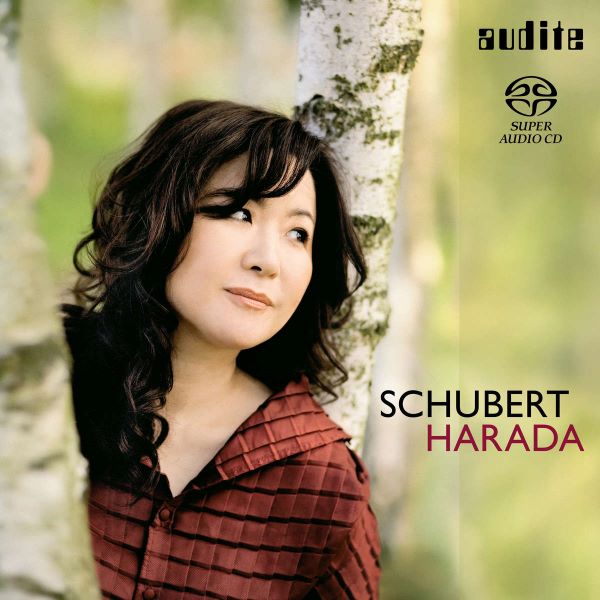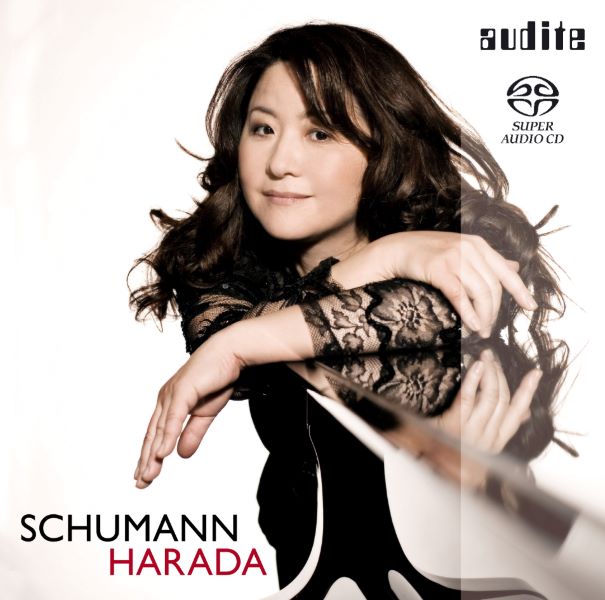The concert from the MDR-Musicsummer on MDR Kultur (Mediathek)
“Whether ardently emotional or dreamily poetic, whether tender or furious: Harada is transported by the music; from delicate chords to breakneck passagework, she exploits the full range of emotions sonically,” remarks the Süddeutsche Zeitung about the Japanese pianist. Today, with her wide-ranging repertoire, she is a much sought-after guest at international festivals, and concertizes with major orchestras.
Harada’s versatility is mirrored as well in her extensive discography, which ranges from works by Samuil Feinberg and Michio Mamiya to Chopin, Grieg, and Scriabin. Her CDs have received numerous awards. The English music magazine Gramophone reviewed her recording of works by Tchaikovsky and Rachmaninoff under “Gramophone Recommends,” commenting: “Two great Russian piano masterpieces in a subtle and soulful recording. Hideyo Harada offers a reading that thrills.” Both her Schubert and her Schumann albums received the “Supersonic Award” from the Luxembourgian music magazine Pizzicato, among other honors, and they were selected by the music magazines Stereo and Fono Forum as “CD of the month.” In Fono Forum, we read: “Hideyo Harada is one of those artists, encountered with greater infrequency of late, who takes a great deal of time to shape interpretations of tremendous musical sophistication and intellectual penetration. (…) Her highly independent selection of points of emphasis allows her to triumph over the competition. To begin with, there is the sheer beauty of her playing, which seems to transport both Schubert’s Wanderer Fantasy and the Sonata D 960 to another sphere. (…) In the Sonata as well, numerous spiritually fulfilled moments in her playing endow the work, beyond its poignancy, with a warm light of compassionate humanity.”
Alongside her Schubert cycle, which encompassed a number of concert seasons, and was realized in Tokyo in collaboration with acclaimed partners, contemporary music occupies an important place within her pianistic activities. She has performed works by, among others, Viktor Ullmann, Ernst Krenek, Toru Takemitsu, Toshio Hosokawa, and Tan Dun, and gave the Japanese world premiere performance of Alfredo Casella’s Scarlattiana op. 44 for piano and orchestra.
Hideyo Harada began her musical training in Tokyo with Toyoaki Matsuura before coming to Europe, where she continued her studies with Lieselotte Gierth in Stuttgart and Hans Kann and Roland Keller in Vienna. She put the finishing touches on her pianistic apprenticeship with Viktor Merzhanov at the Tchaikovsky Conservatory in Moscow. Harada has received prizes at numerous competitions, winning the Concours International d’Exécution Musicale in Geneva, as well as 1st prize at the International Schubert Competition in Dortmund, among others. She was also a prizewinner at the International Rachmaninoff Competition in Moscow.
Harada has made guest appearances, among others, at the Schleswig-Holstein Musik Festival, the Festspiele Mecklenburg-Vorpommern, the MDR-Musiksommer, the Beethovenfest Bonn, the Rheingau Musik Festival, the Mozartfest Würzburg, the Heidelberger Frühling, the Ludwigsburger Schlossfestspiele, the Musikfest Stuttgart, the Festspiele Europäische Wochen Passau, the Yokohama International Piano Festival, and the Grand Piano Festival in Amsterdam. Major performance venues have included the Tchaikovsky Conservatory in Moscow, the Musikverein in Vienna, the Konzerthaus in Berlin, the Gewandhaus in Leipzig, the Alte Oper Frankfurt, the Liederhalle in Stuttgart, Victoria Hall in Geneva, the Rudolfinum in Prague, and Suntory Hall in Tokyo.
Hideyo Harada has appeared with numerous orchestras, among them the Orchestre de la Suisse Romande, the Orchestra Sinfonica Nazionale della RAI, the Stuttgarter Kammerorchester, the Orchestre de Cannes, the Filarmonica George Enescu in Bucharest, the National Polish Radio Symphony Orchestra, the Russian State Symphony Orchestra, the Seoul Philharmonic Orchestra, the NHK Symphony Orchestra, the Yomiuri Nippon Symphony Orchestra, and the New Japan Philharmonic Orchestra. Among her partners at the podium have been conductors such as Petr Altrichter, Christian Arming, Piero Bellugi, Pietari Inkinen, Cristian Mandeal, Tadaaki Otaka, Vladimir Valek, and Marcello Viotti.
In the chamber music context, Hideyo Harada has worked with, among others, the Borodin Quartett, the violinists Latica Honda-Rosenberg and Mikhail Simonyan, the cellist Jens Peter Maintz, and the baritone Roman Trekel. Another facet of Harada’s activities is her participation in musical-literary programs, which she has organized jointly with the actors Corinna Harfouch, Peter Lohmeyer, Thomas Thieme, and Hanns Zischler. Rounding off her musical interests are recordings with international radio and television stations.
For the past four years, parallel to her busy concert schedule, Hideyo Harada has published monthly essays in the prestigious Japanese music magazine Musica Nova. Appearing in 2014 with one of the best-known Japanese publishers was the book The Gift of the Russian Piano School, which illuminates a rich musical heritage from a variety of perspectives through a selection of artistic personalities – beginning with the era of Peter the Great, and continuing up to the celebrated piano virtuosi of the present day.

